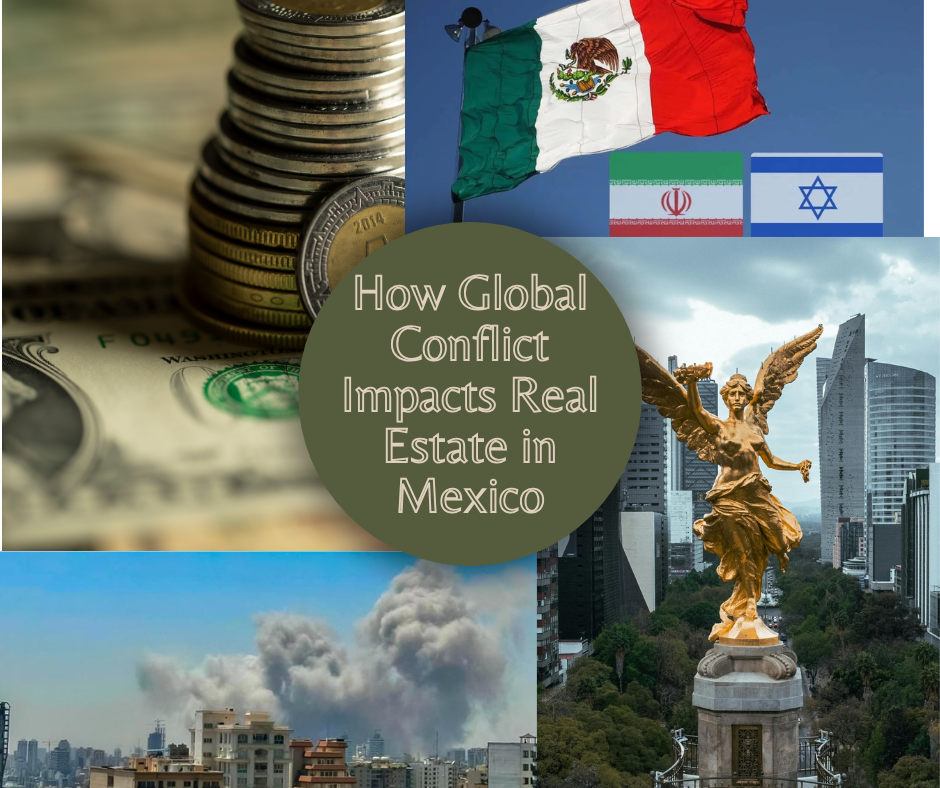
26 de Junio 2025
Ventas
In today’s globalized world, no major international event occurs in isolation. The recent escalation between Iran and Israel is a geopolitical development with wide-reaching implications not only for diplomacy and security, but also for global markets and local economies.
So, what does this mean for Mexico? And more specifically, how could it affect the country’s real estate sector?
Let’s break it down
1. Oil Prices and Construction Costs
Iran is one of the world’s major oil producers. When a conflict threatens supply routes or production levels in the Middle East, oil prices typically surge.
For Mexico, this can mean:
- Higher transportation and energy costs
- Increased construction material prices
- Rising costs for developers, buyers, and investors
2. Volatile Dollar
Yes, the U.S. dollar is also under pressure and is not always a 100% safe asset. Although it typically strengthens in times of global tension, its behavior can become erratic if:
- The war drags on or escalates to involve other actors (such as Lebanon or the U.S.)
- Stock and debt markets are disrupted
- Perceived risk in the U.S. increases or fiscal debt levels worsen
Risks:
- If you buy in U.S. dollars but the Mexican peso suddenly strengthens, your investment may lose value when converted back.
- If you sell or earn rental income in pesos but your debt or expected returns are in dollars, you may face currency mismatches.
But there’s also opportunity:
- Investing in real estate priced in pesos but generating income in dollars (such as Airbnb rentals for foreign guests) can be a defensive strategy.
- If you hold liquidity in dollars and the exchange rate is high, you may be able to purchase property in Mexico at a better value especially in dollarized areas like coastal or tourist destinations.
3. Supply Chain Disruptions
A war in the Middle East especially one involving Iran, can disrupt critical trade routes like the Strait of Hormuz, where a significant share of the world’s oil and goods pass through.
For the real estate sector:
- Delays in development projects
- Limited availability of imported construction supplies
- Rising logistical costs and timeline uncertainties
4. A Shift in Investment Strategy
When global markets become volatile, investors often seek out stable, high-demand local markets. In this context, several Mexican cities may become more attractive:
- Oaxaca, Mérida, Mexico City, and similar destinations offer cultural value, tourism, and long-term growth potential
- Short-term rental markets (e.g. Airbnb) remain strong in these areas
- Capital flight from riskier markets may find its way into Mexico’s real estate
5. What Should Investors and Developers Do?
This conflict reminds us of the importance of having a global perspective while executing with local intelligence.
Key recommendations:
- Evaluate risk exposure in ongoing or planned projects
- Monitor inflation, interest rate movements, and currency fluctuations
- Focus on properties in resilient, high-demand locations
- Act proactively, not reactively
Pros & Cons: How Global Conflict Impacts Real Estate in Mexico
✅ PROS – Opportunities
- Mexico as a Safe Investment Hub
Global instability may lead investors to consider stable, culturally rich markets like Mexico. - Boom in Short-Term Rentals
Cities like Oaxaca or Mérida could see increased demand in vacation or mid-term rentals. - Pre-construction Purchases Become Strategic
Buying before construction costs spike could yield high returns. - Real Estate = Safe Tangible Asset
In uncertain times, real estate continues to be seen as a hedge against market.
❌ CONS – Risks and Challenges
- Rising Construction Costs
Global oil and material prices affect development budgets and timelines. - Currency Devaluation
A weaker peso makes imported goods more expensive and affects ROI. - Higher Interest Rates
Local lenders may increase rates to combat inflation, making mortgages less affordable. - Cautious Buyer Sentiment
Uncertainty could delay purchases, especially for high-end or speculative assets.
Conclusión
Although the Iran–Israel conflict may feel geographically distant, its economic ripple effects are real. For Mexico, and especially for its real estate sector, this is a time to stay informed, protect investments, and make decisions based on both local opportunities and global trends.






